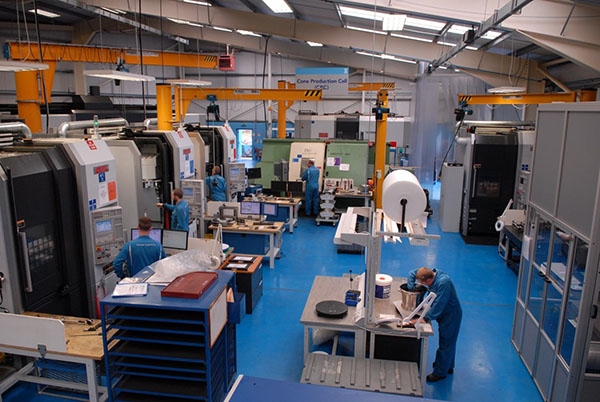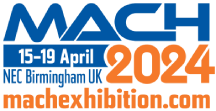
Glasgow-based Castle Precision Engineering has been an advocate for the use of VERICUT CNC simulation software from CGTech on its shop floor for many years, protecting high-value customer components, as well as its own advanced machine tools. More recently, the company has embraced the efficiency and productivity gains offered by the Force software module.
While Castle supports a number of advanced sectors, such as medical devices and power generation, the majority – around 90% – of its circa £20m annual turnover comes from the aerospace and defence industries. To cater to the diverse needs of its customer base there are three focused sub-divisions that encompass what the business has to offer: Rotatives, Prismatics and Toolroom.
Roy Yuile, manufacturing engineering manager at Castle, explains: “Rotatives and Prismatics are the two core areas of our production business, and both require extremely high levels of precision and machining expertise. Over the years, we’ve carved out a niche for ourselves in manufacturing critical rotating parts for the aero engine market. The failure of these parts can bring an aeroplane out of the sky, so our OEM customers are not only trusting us with their reputations, but also with the safety of the pilots and passengers whose flights they power. We also manufacture a wide range of complex prismatic products to very exacting tolerances for applications such as defence optronics and hydraulic actuation systems for control surfaces and landing gear.”
The company typically machines prismatic parts from relatively straightforward materials, primarily aluminium alloys along with some steel and titanium. However, rotating aero engine components usually involve more exotic and difficult-to-machine materials, including titanium and nickel-based super alloys, where forgings valued up to $100,000 for a single workpiece are not uncommon.

With a population of around 60 CNC machine tools representing the very latest multi-axis manufacturing technology from DMG Mori, Makino, Doosan and Grob, the shop floor at Castle Precision is a lesson in housekeeping and efficient organisation for all to see. Protecting this advanced manufacturing capability is VERICUT CNC simulation software.
Roy Yuile says: “CAD is at the front end of our engineering workflow. We’ll either import a 3D model supplied by the customer or draw one up from a 2D definition, and break this down into the various stages of manufacture from material supply to finished part. These stage models and their accompanying fixtures or work-holding devices are transferred to CAM, where we’ll build tools, generate tool paths, post NC code and then port the whole job straight into VERICUT using their CAM interface.”
He continues: “VERICUT has been an established part of our workflow for well over a decade. Nothing goes out to a machine without first going through VERICUT. It’s an essential safely net, not just for the product but for our machines and our personnel. We’ll have some programs in our factory that have been around for 10 or 20 years, alongside jobs that are fresh out of CAM. VERICUT simulates any new or modified code before it goes out to a machine. We have a digital twin for almost every machine tool, and because VERICUT reads the same G-code as the machine controller, it’s completely CAM-agnostic and can simulate code from any source.”
Very often, VERICUT drives process improvements because the software offers the opportunity to prove edits in a virtual environment.

“We don’t edit at the machine console because of the risk involved,” says Yuile. “If you mess up you have no safety net. Instead, our engineers will bring the code back into VERICUT, make their edits and then hit simulate to check that the program is safe to release. Smashing pixels is a whole lot cheaper and safer than writing off a machine tool, so verifying code using a digital twin before we actually put anyone or anything at risk is an integral part of our workflow. This risk-based approach is absolutely crucial, not just in aerospace and defence, but for any high-value product and business.”
With VERICUT an established part of Castle’s business for the past 12 years, the software has proven its ability to protect the company, along with being a key improvement tool for its manufacturing processes.
Yuile states: “VERICUT Force is a step further along this curve. Moving beyond goalkeeper functionality, Force allows us to start optimising our processes, as well as proving that they are safe.”
Every manufacturing business faces the same three challenges from its customers: quality, delivery and cost.
“Generally, quality and delivery are a given, and cost is where we win or lose,” Yuile says. “The pressure within the aerospace industry on cost is enormous and, for us to be competitive against global competition, we have to be smarter, faster and more efficient. Physics-based optimisation software has been on our radar for a while, and we started looking at it seriously a couple of years ago.

“There are a few key players in that market and we evaluated them all,” he adds. “There’s a lot of clever maths behind it, but the basic idea of physics-based optimisation is to analyse a toolpath line by line, calculate the forces acting on the cutting tool at any given point in time and then adjust the feed rate in order to balance or control that force and chip load. This means there’s a lot of number crunching involved, but before you even get there you need to build an accurate digital model of the machining process. Since we already simulate every job in VERICUT, the major advantage of VERICUT Force is that building this model takes almost no additional effort – all Force needs is a bit more information on tool geometry and material characteristics, everything else is already there. The cycle time savings you can expect to get from this kind of optimisation are typically 10-20% and VERICUT offered an almost ‘plug and play’ solution for both milling and turning that was really attractive.”
Force has been in use at Castle for about a year, and Yuile is keen to highlight one of the often-overlooked benefits: consumables spend.
“Carbide cutting tools are a major expenditure for us,” he states. “When we’re costing a job, the two key variables are how long it’s going to take and how much we’re going to consume in carbide. Any reduction in cycle time that Force can deliver is good, but so is any improvement in tool life. Although cycle time is a monetary saving in the sense that you free up machine capacity that which you can sell to somebody else, consumables are a direct cash spend. If it takes £100 of carbide to make a particular part and we can reduce that to £80, we are literally not spending £20. That £20 stays in our bank account. Cycle time savings are soft money, they’re potential revenue, while consumables spend is hard money, it’s cash.”
Concludes Yuile: “We trust VERICUT, and that trust comes from experience. When manufacturing high-value components for critical applications, we need to have confidence that we’re using the very best tools for the job, and VERICUT delivers.”
For further information
www.cgtech.co.uk














